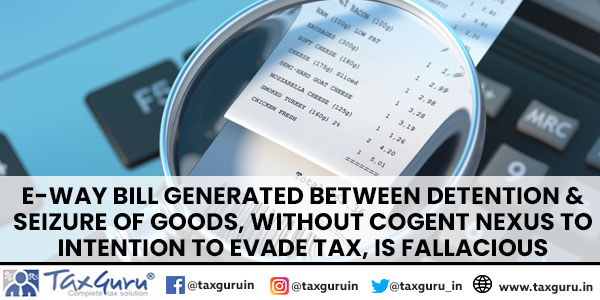E-way bill generated between detention and seizure of goods, Without Cogent Nexus to Intention to Evade Tax, Is Fallacious
Introduction
Mere technical errors, without having any potential financial implications, should not be the grounds for imposition of penalties. The underlying philosophy is to maintain a fair and just tax system, where penalties are proportionate to the gravity of the offense. In the realm of taxation, imposition of penalty serves as a critical measure to ensure compliance with tax laws and regulations. However, a nuanced understanding prevails within legal frameworks that for penalties to be justly imposed, there must be a demonstrated actual intent to evade tax. This principle underscores the importance of distinguishing technical errors from deliberate attempts to evade tax obligations. Penalties should be reserved for cases where an intentional act to defraud the tax system is evident, rather than for inadvertent technical errors. The legal foundation for this principle lies in the recognition that taxation statutes are not designed to punish inadvertent mistakes but rather deliberate acts of non-compliance. The burden of proof, therefore, rests on tax authorities to establish the actual intent to evade tax before imposing penalties on taxpayers. This safeguards individuals and entities from punitive measures arising from honest mistakes, administrative errors, or technical discrepancies that lack any malicious intent. In this backdrop we are going to discuss E-way bill detention cases which are being handled by industry as well as tax practitioners in day to day affairs.
Section-129 and Section-130 of the CGST Act deals with the detention, seizure, release, confiscation of goods or conveyance in transit and levy of penalty respectively if violation of the provisions of the CGST Act is found.
A combined reading of Sections-68,129 and 13 of CGST Act,2017 read with rules 138,138A, 138B, 138C and 138D of CGST rules shows that goods can be detained and tax and penalty can only be demanded in the following;
1. The goods are liable for confiscation only when the same is transported in contravention of the provisions of CGST Act,2017 and the rules framed thereunder.
2. There is intention to evade payment of taxes.

Further, intention to evade payment of taxes cannot be proved until and unless tax charged by the consigner on tax invoice has been paid and the same is uploaded on GST portal and additionally vehicle number also mentioned in invoice without any further discrepancy while physical verification of goods.
It is a settled law that if the e-Way Bill is generated and produced before the passing of the order under Section 129(3) of the CGST Act, 2017 and if the goods are carried with 7 all the other relevant documents evidencing payment of due tax, then in that case the detention and seizure of goods is wholly baseless and the same defeats the purpose of the said Acts. The said position has been clarified by this Court in the case of Modern Traders v. State of UP (Writ Tax No. 763 of 2018). The writ petition in the said case was allowed and the penalty order therein was set aside.
Furthermore, in the case of Falguni steels vs State of UP (Writ Tax No. 146 of 2023) same was considered where the facts of the case were:
1. The instant writ petition has been filed by the petitioner, M/s Falguni Steels praying for the issuance of a writ of certiorari against the order dated February 21, 2019 passed by the Assistant Commissioner, Commercial Tax, (Mobile Squad), Unit – II, Prayagraj (hereinafter referred to as ‘Respondent No. 2’) and the order dated October 20, 2019 passed by the Additional Commissioner, Grade – 2, (Appeal) – I, Commercial Tax, Prayagraj (hereinafter referred to as ‘Respondent No. 3’).
2. Factual matrix of the instant case has been laid down below: a. the petitioner is an authorized dealer of the Steel Authority of India Ltd. (hereinafter referred to as ‘SAIL’). On February 17, 2019, the petitioner purchased a consignment of TMT Bar under the Tax Invoice Nos. OS0020005822 & OS0020005823. The said tax invoices were issued by SAIL in accordance with the provision of Section 31 of the Central Goods and Services Tax Act, 2017 (hereinafter referred to as the ‘CGST Act, 2017’) read with Rule 46 of the Central Goods and Services Tax Rules (hereinafter referred to as the ‘CGST Rules, 2017’)
b. Thereafter, the petitioner obtained the service of a private road carrier for the transportation of its goods through vehicle bearing registration No. UP-70-AT-3747 from SAIL Yard, Naini, Allahabad, to Falguni Steels, Lookerganj, Allahabad. The tax invoices contained the number of the said vehicle.
c. The petitioner alleges that during the relevant time, the e-Way Bill portal of the Department was marred by glitches and technical shortcomings and owing to the said fact, e-Way Bills on several occasions could not be generated by the Transporters/Consignors/Consignees.
d. Owing to the above stated glitch, e-Way Bills could not be generated by the time of the onset of the transportation of the Good. The said e-Way Bills were generated on February 20, 2019 (No. 47051859886) and February 21, 2019 (No. 481051862043). The petitioner states that the said e-Way Bills were presented before the Respondent No. 2 at the time of the interception of the goods and before the issuance of the Show Cause Notice as well as passing of the order under Section 129(3) of the Uttar Pradesh Goods and Services Tax Act, 2017 (hereinafter referred to as the ‘UPGST Act, 2017’). However, the said e-way Bills were not taken into consideration by the Respondent No. 2
e. The supplier SAIL had generated Invoices Nos. OS0020005822 and OS0020005823, both dated February 17, 2019 wherein the quantity, description of goods and the vehicle number were mentioned. The petitioner states that the transportation of the goods on the same day was not possible due to the barrier imposed by the local administration for transportation, due to the occasion of “Maghi Purnima, Kumbh Mela, 2019”. These goods were transported on February 20, 2019 from SAIL Yard, Naini to Lookerganj, Allahabad
f. Show Cause Notice (FORM GST MOV – 07) was issued to the petitioner under Section 129(3) of the UPGST Act, 2017 on February 21, 2019 alleging that the movement of the goods was in contravention to the provisions of the UPGST Act, 2017. The said Show Cause Notice required the petitioner to show cause as to why tax of an amount of INR 1,29,862/- along with an equivalent penalty of INR 1,29,862/- ought not to be recovered from it.
g. The petitioner, thereinafter, deposited the amount of INR 2,59,724/- through CPIN No. 19020900359828 dated February 21, 2019 via Reserve Bank of India towards tax and penalty, after which, the Respondent No. 2, released the goods in favor of the petitioner Aggrieved by the order dated February 21, 2019, passed by the Respondent No. 2, the petitioner preferred a statutory appeal before the Respondent No. 3.
Conclusion: Even though the petitioner failed to produce the e-Way Bill in time due to certain technical difficulties, the question which arises whether or not there was any actual intent to evade tax on part of the petitioner. In the case of VSL Alloys (India) Pvt. Ltd. v. State of U.P. and Another reported in 2018, while dealing with a situation where Part- B of the e-Way Bill was not generated, this Court observed that the petitioner therein was supposed to fill up Part- B of the e- way Bill giving all the details including the vehicle number before the goods were loaded in a vehicle, and it failed to do so. However, there was no ill intention at the hands of the petitioner therein to evade tax, since the documents accompanying the goods contained all the relevant details.
The requirement of intent to evade tax for the imposition of penalties is a fundamental principle that underpins the fairness and 18 integrity of taxation systems. Recognising the distinction between technical errors and intentional evasion is essential for maintaining a balanced and equitable approach to tax enforcement. As nations continue their pursuit of effective tax administration, upholding this principle becomes paramount in fostering voluntary compliance, preserving trust in the tax system, and ensuring the judicious use of regulatory powers.
*****
Disclaimer : The entire content of this document have been prepared based on relevant provisions and as per the information existing at the time of the preparation .Although care has been taken to ensure the accuracy, completeness, and reliability of the information provided, I assume no responsibility, therefore. Users of this information are expected to refer to the relevant existing provisions of applicable laws. The user of the information agrees that the information is not professional advice and is subject to change without notice. I assume no responsibility for the consequences of the use of such information.
IN NO EVENT I SHALL BE LIABLE FOR ANY DIRECT, INDIRECT, SPECIAL OR INCIDENTAL DAMAGE RESULTING FROM,ARISING OUT OF OR IN CONNECTION WITH THE USE OF THE INFORMATION.





